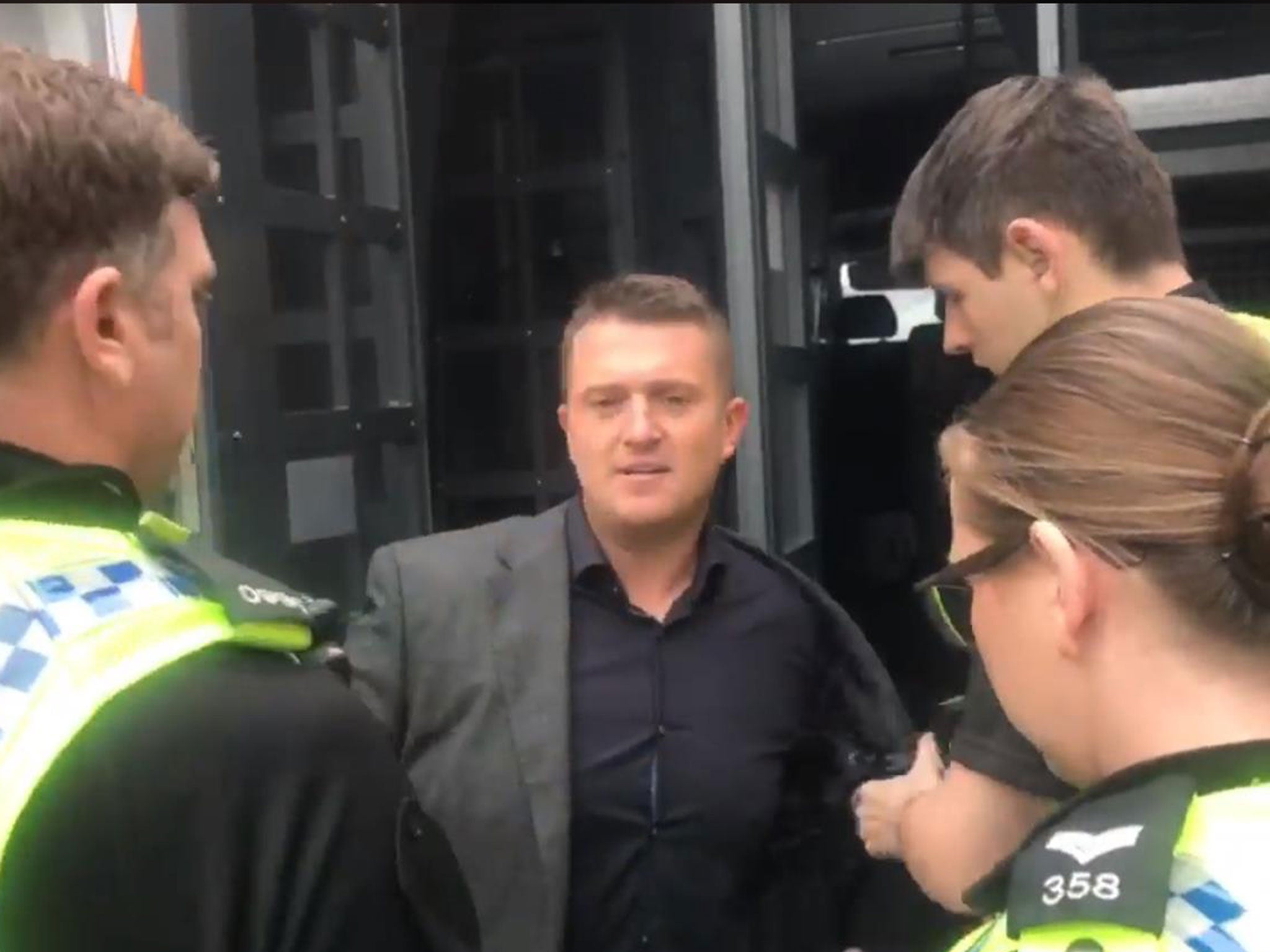Tommy Robinson jailed after breaking contempt of court laws with Facebook Live video
Ruling can be legally revealed for first time after legal challenge by journalists
Tommy Robinson has been jailed for 13 months for breaking contempt of court laws with a Facebook Live video.
His sentence can be revealed for the first time after The Independent and Leeds Live fought a reporting restriction put on the case at Leeds Crown Court.
Robinson, whose real name was listed on court documents as Stephen Yaxley-Lennon, was arrested outside the court on Friday.
He admitted committing contempt of court by publishing information that could prejudice an ongoing trial via a live stream on his Facebook page.
At one point the video was being viewed by more than 10,000 people, as Robinson attempted to film defendants entering the court and discussed the case, which is subject to a separate reporting restriction.
A judge initially banned media reports of contempt proceedings against Robinson over fears it could affect the ongoing trial, but lifted the order on Tuesday after hearing submissions that members of the public and foreign media outlets were publishing inaccurate information.
Supporters of the far-right figurehead have protested over his imprisonment and the reporting restrictions, using them to claim the "establishment" was attempting to silence his views.
Donald Trump Jr, the US President's son, shared a tweet from a Robinson supporter with the comment "don't let America follow in those footsteps", while foreign politicians including Dutch opposition leader Geert Wilders have called for his release.

A "free Tommy" protest is being planned for London's Whitehall on 9 June, while a petition to free him has reached almost half a million signatures and assistants have directed supporters to donate money for legal fees online.
Robinson made clear that he was aware of the restrictions during the Facebook Live video, as well as the danger of being jailed.
The 35-year-old was already subject to a suspended sentence for committing contempt during a rape trial in Canterbury last year, and had been told that if he fell foul of the law again he would go to prison.
“There is a reporting restriction on this case,” the former English Defence League (EDL) founder said.
“I have to be super careful, you see, because when I was coming to these court cases, part of what the police did was they dawn raided me and they put me on a contempt of court charge, which would mean that I could face prison.”
Robinson first broke contempt of court laws, which aim to safeguard the judicial process and stop trials collapsing over fears the jury has been swayed, in May 2017.
He was prosecuted for attempting to film defendants at Canterbury Crown Court, despite notices stating the move is illegal all over the building.
Making a clear distinction between “legitimate journalism” and Robinson’s activism while sentencing him, Judge Heather Norton said: “This contempt hearing is not about free speech. This is not about the freedom of the press.
“This is not about legitimate journalism; this is not about political correctness; this is not about whether one political viewpoint is right or another. It is about justice, and it is about ensuring that a trial can be carried out justly and fairly.”
Judge Norton sentenced Robinson to three months’ imprisonment but suspended the sentence for 18 months, meaning it would not come into effect if he committed no further offences, after his lawyers claimed he was ignorant of the filming ban.
“You will now be under no illusions whatsoever as to what you can and cannot do,” she said at the time.
“If you commit any further offence of any kind, and that would include a further contempt of court by similar actions, then that sentence of three months would be activated, and that would be on top of anything else that you were given by any other court.”
Britain First leader Paul Golding and Jayda Fransen were jailed for religiously-aggravated harassment over their actions during the same trial, when they filmed and harassed people they incorrectly believed were involved, posted offensive leaflets and shouted racist abuse at a family home.
Their actions endangered the prosecution of three men and a 17-year-old boy who were jailed in September for raping a 16-year-old girl who had asked them for directions, after taking her to a flat above a kebab and pizza restaurant in Ramsgate.
Robinson previously raised fears the Finsbury Park terror attack trial would collapse after he live-streamed interviews with journalists before the verdict was handed down.
Prosecutors and the former head of national counter-terror policing said his posts had radicalised Darren Osborne, who consumed Robinson’s posts and other far-right material as he plotted to ram a van into Muslims.
Robinson formerly broadcast his activities on Twitter as well as Facebook, but was permanently banned from the platform earlier this year.
He co-founded the English Defence League (EDL) in 2009 and has been arrested numerous times during demonstrations and at fights between football fans, as well as being jailed for mortgage fraud in 2014.
Despite claiming to have made friends with Muslim prisoners during his time inside, he attempted to found a British branch of the German anti-Islam group Pegida in 2015.
He later became a correspondent for Canadian right-wing website Rebel Media and has since started his own site.
Robinson has been increasing his international audience by working with members of the American alt-right and ethno-nationalist Generation Identity movement, whose leaders have been prevented from entering the UK.

